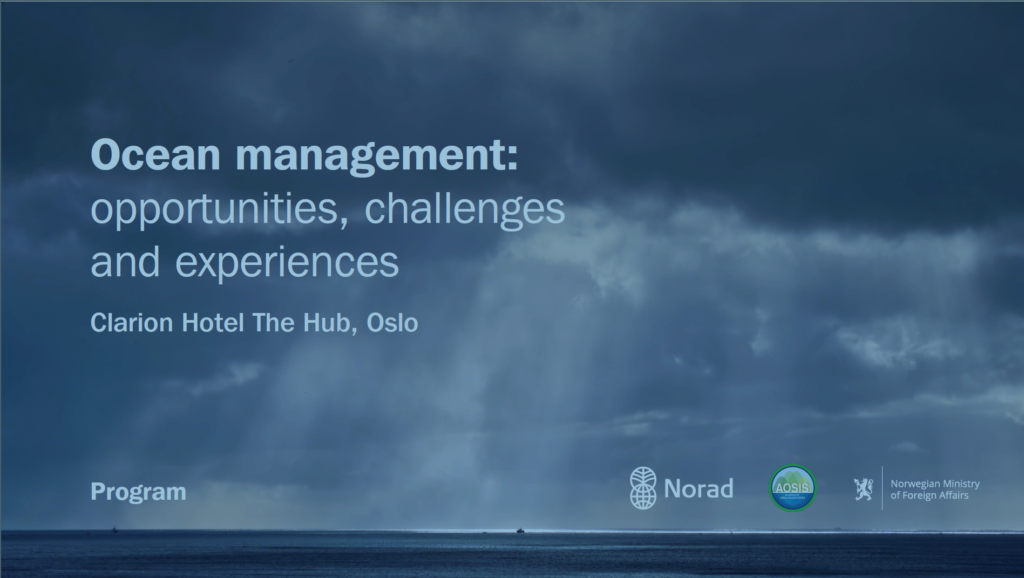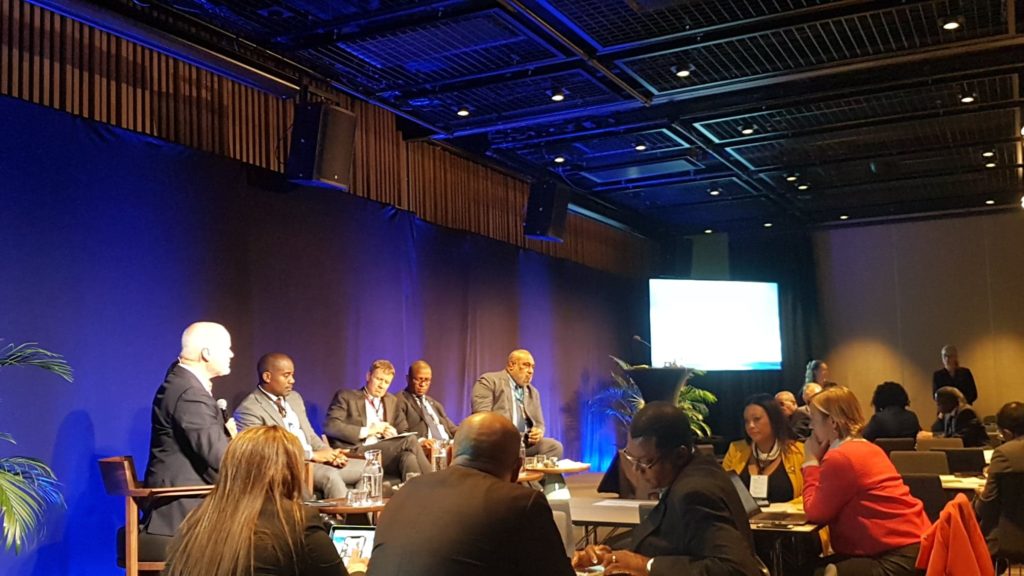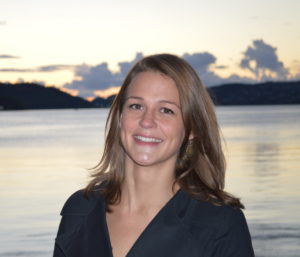OceanStates postdoctoral fellow Dr. Camilla Borrevik shares observations and insights from the seminar Ocean management: opportunities, challenges and experience, which took place in Oslo this October.

![]()
On 22 October 2019, I participated in the seminar “Ocean management: opportunities, challenges and experience” in Oslo, Norway. The seminar was organised by the Norwegian Agency for Development Cooperation (Norad), in cooperation with the Norwegian Ministry of Foreign Affairs (MFA) and the Alliance of Small Island States (AOSIS). The goal was to provide a platform for exchanging experiences and knowledge on the sustainable use of oceans and to promote sustainable development and economic growth in Small Island Developing States (SIDS).
Attending the one-day seminar were a number of prominent ministers, ambassadors and other officials from several Small Island Developing States and Norway, as well as scientific experts within ocean related research fields. In his opening speech, Norway’s Minister of International Development Dag-Inge Ulstein highlighted the importance of collaboration across regions and areas of expertise in order to achieve the Sustainable Development Goal (SDG) Target 14.2 to sustainably manage and protect marine and coastal ecosystems by 2030. “International cooperation is essential” Minister Ulstein stated, highlighting the importance of working together to secure sustainable and integrated ocean management.
![]()
Palau’s Ambassador to the United Nations Ngedikes Olai Uludong then set the scene by providing an overview of both opportunities and challenges in ocean management facing SIDS today. The Ambassador rightly pointed out that climate change impacts do not know any political boundaries and that any management approaches therefore must reflect transboundary consequences and uncertainty. This necessitates a need to align ocean management efforts, and for policy-makers to include science and knowledge in the process. Ambassador Uludong also highlighted the importance of SIDS voices in the negotiating process of an international legally binding instrument under the UN Convention on the Law of the Sea (UNCLOS), on the conservation and sustainable use of marine biological diversity of areas beyond national jurisdiction (BBNJ). It is furthermore important, she stated, that such international mechanisms should not undermine national initiatives by SIDS.

The seminar was organised into three separate thematic sessions, each with a series of keynote addresses, presentations and debates. The speakers consisted of ministers and officials from SIDS, representatives of multilateral institutions and regional organisations, experts and Norwegian officials. The first session, which focused on the role of knowledge and science in ocean management, was chaired by Peter Haugan, Programme Director at the Institute of Marine Research (Norway) and former Chair of the Intergovernmental Oceanographic Committee (IOC-UNESCO). Drawing on his experience and involvement in the creation of the UN decade of Ocean Science, Haugan underlined the importance of well-informed integrated ocean management processes. Explaining future impacts on the EEZs of SIDS, Dr. Vera Agostini, Deputy Director of the Fisheries and Aquaculture Department at the UN, Food and Agriculture Organization (FAO), showed that there will be major changes in the catch of tuna by 2050, as tuna will move in and out of EEZs differently. Such changes will bring forth serious consequences for many SIDS on economic and environmental scales. The panel discussion that followed therefore highlighted in particular the urgency of action and the strong cooperation between scientists, other knowledge holders and policy-makers.
![]()
In the second session of the day, representatives from various governments were asked to share lessons learned and best practices on regional and integrated ocean management. Starting on a comparative note, the session chair and Norway’s Special Envoy for the Ocean Vidar Helgesen asked the participants what we may learn from each other across regions. Drawing on her long experience on regional issues in the Pacific, the Hon. Fiame Naomi Mataafa, Deputy Prime Minister and Minister Of Natural Resources and Environment of Samoa, highlighted the importance of building up a regional collective “Blue Pacific Identity”. She argued that this shows ownership for Pacific peoples’ futures and the strong connection between ocean and people. “Ocean issues cannot be separated from other development issues”, the Minister stated. This was echoed by the Director General at the Pacific Regional Environment Programme (SPREP), Kosi Latu, who pointed to the importance of having stewardship of the ocean, as opposed to ownership, when looking after it and taking care of the ocean for future generations. “We are Big Ocean States,” he argued, “but we need a paradigm shift to redefine what development is into one that incorporates healthy environments as well.”
![]()
Turning to integrated ocean and coastal zone management in the third and final session of the day, the Chair Peter Thomson started strong by arguing that the management of EEZs must be comprehensively planned. The order of how to do this, he claimed, should be “Science –> Planning -> Finance” for management to be successful. Drawing on her important experience on this issue, Ms. Cristelle Pratt – who is the Deputy Secretary General of the Pacific Islands Forum Secretariat (PIFS) – highlighted a need in the Pacific region for connectivity to markets, as well as strong disaster risk reduction structures. In the final discussion, the participants shared thoughts on finding the balance between production and protection. In a follow-up point made by the Hon. Fiame Naomi Mataafa, it also became clear that finding such a balance is connected the establishment of genuine partnerships. “What is the fundament of a partnership?” she asked the participants, thereby drawing important final attention to the notion of equity in any partnership.
The seminar provided an important arena for SIDS, Norway and ocean researchers to come together and share their experiences. The issues that were discussed throughout the day highlighted a range of important and pressing issues the OceanStates project aims to investigate, such as the future of EEZs in the Pacific region and the need for ocean and climate initiatives on international, regional and national levels. The seminar thereby successfully set the scene and agenda for future collaborations between policy-makers, experts and governments.
![]()
 Dr. Camilla Borrevik is a Postdoctoral Fellow and Deputy Director of the OceanStates project. She is a member of the Bergen Pacific Studies research group and holds a PhD in Social Anthropology from the University of Bergen. Dr. Borrevik’s research focuses on climate change, diplomacy, policy, knowledges and Pacific regionalism.
Dr. Camilla Borrevik is a Postdoctoral Fellow and Deputy Director of the OceanStates project. She is a member of the Bergen Pacific Studies research group and holds a PhD in Social Anthropology from the University of Bergen. Dr. Borrevik’s research focuses on climate change, diplomacy, policy, knowledges and Pacific regionalism.